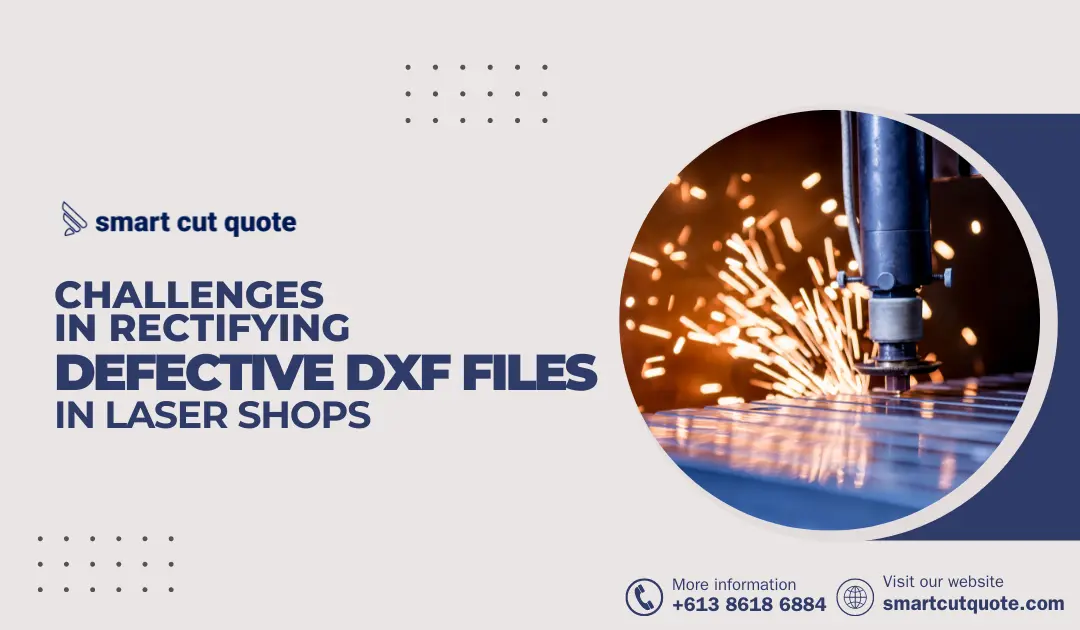Challenges in Rectifying Defective DXF Files in Laser Shops
Precision is the cornerstone of laser cutting operations, with laser shops heavily reliant on CAD files, particularly in the DXF (Drawing Exchange Format), to achieve accuracy in their cutting processes.
However, a common challenge arises when customers submit CAD drawings fraught with errors or inaccuracies, subsequently impeding the production process.
In this article, we delve into the predicaments confronted by laser shops when handling erroneous DXF files, the considerations regarding charging additional fees for corrections, the significance of customer education, the ubiquity of this issue within the industry, and the pivotal role played by Smart CAD tools, such as Smart Cut Quote, in addressing these challenges.
- Challenges Encountered in DXF File Rectification:
- Misalignment and Overlapping Lines: Inaccurate drawings often lead to misaligned or overlapping lines, causing deviations in the cutting process.
- Unclosed Geometric Shapes: DXF files may comprise unclosed shapes that necessitate closure to ensure precise cutting.
- Scaling Discrepancies: Drawings may be incorrectly scaled, resulting in parts that are either too large or too small for the intended purpose.
- Complex Geometries: Complex, intricate shapes in customer-provided DXF files can be particularly challenging to interpret and cut with precision.
- Considerations on Charging Supplementary Fees for Corrections: While some laser shops may contemplate charging additional fees for rectifying DXF files submitted by customers, this approach warrants careful deliberation. Such charges may be perceived as discouraging potential clients and could potentially sour business relationships. Alternatively, shops may choose to incorporate a provision for file correction within their pricing structure, ensuring that customers receive a quality end product without any surprise costs.
- The Importance of Customer Education: Fostering customer awareness regarding the significance of submitting accurate, error-free DXF files is of paramount importance. This can be accomplished through transparent communication, the provision of guidelines, and recommendations for preparing CAD files. Offering educational resources, such as tutorials or templates, can be instrumental in helping customers enhance the quality of their submissions.
- The Prevalence of the Problem: The issue of flawed DXF files is not uncommon within the laser cutting industry. Many customers may lack familiarity with CAD software or may not be well-versed in the intricacies of file preparation. Consequently, laser shops frequently grapple with the task of rectifying files before commencing production.
- Smart CAD Tools like Smart Cut Quote: Smart CAD tools, exemplified by Smart Cut Quote, serve as invaluable assets for laser shops in managing DXF files. These tools often incorporate features for error detection and correction, automatically identifying and rectifying commonplace issues encountered in customer-provided drawings. By streamlining the file preparation process, these tools mitigate the need for manual corrections, thereby bolstering operational efficiency.
In conclusion, the challenges linked to the rectification of flawed DXF files in laser shops are not atypical. Addressing these challenges demands a holistic approach that encompasses customer education and, potentially, the integration of intelligent CAD tools like Smart Cut Quote.
By collaborating with customers to improve the quality of CAD submissions and incorporating tools to expedite the file preparation process, laser shops can augment operational efficiency, curtail expenses, and deliver superior-quality products to their clientele.
Ultimately, this approach proves mutually advantageous, enhancing the overall efficacy of the laser cutting process for both service
For more information about Smart cut Quote Software and product inquiries, please contact us at https://nctools.com.au/ or call us on +61 3 8618 6884
Or Visit https://smartcutquote.com/

